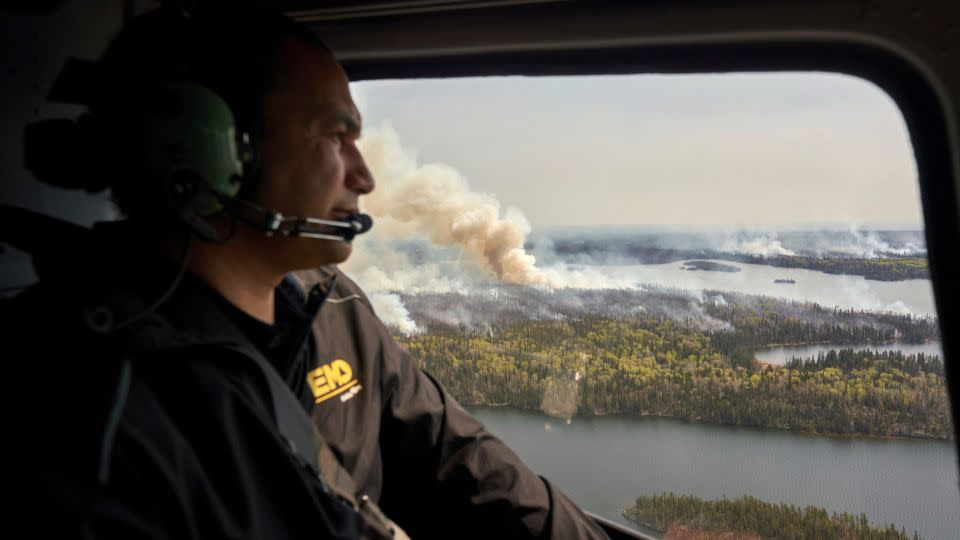Editor’s note: Pamela Appea is a New York-based journalist covering health, science and intersectionality. The opinions expressed here are her own. To read more opinion on CNN
Asthma shortened my mother’s life and sickened each of my two children at various points in their lives. During a relatively brief episode in my life, I also fell ill a few years ago. I’m better now, but I worry that the asthma could always come back, altering my family’s life, sending us rushing for late-night visits to the emergency room or causing my children to miss another day of school.

I worry about asthma In the winter when cold, dry air can cause narrowed and irritated airways, making it difficult to take in each breath. I worry about this in the spring, when pollen in the air can cause wheezing, coughing and shortness of breath. I worry about this in autumn because my lungs are not used to the increasing cold and when ragweed pollen fills the air.
But these days, my fears about asthma are mostly concentrated in the summer months.
Last year, clouds of thick black smoke cascaded from raging wildfires in Canada, darkening skies over the northern plains of the US and polluting the air as far away as New York City, where I live. These blankets of pollution covered much of the US and reached communities as far away as Florida. Some of the smoke until found his way to Europe. My family weathered the worst of the pollution indoors, and luckily none of us got sick.
Now we may be on the verge of a repeat of what happened last summer – and families like mine, with a history of asthma, are bracing themselves again. Stultifying heat and Devastating wildfires are back in Canada. Last month, fires on the Canadian border led to evacuations of hundreds of people. Minnesota and Wisconsin last month issued warnings that people should stay indoors.
This was in mid-May, when it was still spring. I shudder to think what August will bring. The research showed that Forest fire smoke may be linked to the onset of asthma. According to the US Centers for Disease Control and Prevention, there are some 25 million Americans with asthma, so I suspect that many, many others feel the same sense of dread as I do.
There’s another connection between Canada, asthma and my family – and it’s somewhat accidental. My mother, an immigrant from Ghana, lived in Canada for many years, although she only developed asthma when we moved to the United States.
Its tortuous path is not unknown to migrants coming from Africa to North America. After emigrating from Ghana, my mother spent a few years in England and then moved to Quebec, where she lived and worked. Divorced, she was left alone to raise me, my older sister and two older brothers. She ultimately decided that New York City, with its rich immigrant community, including a good number of people from the African diaspora, was a better place to raise her family than the remote village in rural Canada where we were staying. among the only black people.


But shortly after arriving in the United States, my mother developed asthma as an adult. This could have been caused by stress, whether environmental issues, genetics or a combination of factors, it is impossible to say. At the time she started getting sick more frequently, I was about 10 years old. But even at that young age, I quickly realized that asthma medications in the United States were prohibitively expensive. The high price meant that the medicine my mother desperately needed was sometimes out of reach.
After losing someone so close to me to asthma, I became intimately familiar with the signs of the disease. My mother didn’t usually confess to me and my three older brothers that she was feeling ill, but as a child I learned to interpret her symptoms. I remember the helplessness I felt during his asthma attacks, as his wheezing became progressively worse.
I worried during the doctor’s appointments I sometimes accompanied her to, when she recited her list of ailments—chest tightness and inability to take a deep breath. After her bouts of labored breathing, my mother seemed exhausted and drained. I now understand that asthma episodes, especially undertreated ones, can place significant stress on the body. I wonder if the damage caused by the cumulative effect of her asthmatic episodes is what cost her her life.
Unfortunately, the challenges my mother faced in obtaining asthma medications persisted. Uncovered co-pays and prescription costs strained our family’s budget. There were times when my mother would not fill prescriptions for asthma medication out of concern about the cost. Then one night, about three decades ago, her asthma struck again. It was a particularly severe episode that left my mother so short of breath that she couldn’t utter more than a few words at a time.
Before I completely lost the ability to speak that day, my mother asked me to call a family friend to take her to the hospital – she was worried, as always, about money and how the cost of an ambulance would put a further strain on her finances. of our family. When we finally got to the emergency room, she was unconscious. A short time later, she was gone. Asthma struck my mother at just 48, in what should have been the prime of her life.
Over the years, with the signs and symptoms after years of living with asthma – first as the child of someone with the disease, then as the mother of two children who developed severe asthma. I know asthma has a genetic component. Research shows that if you have a parent with asthma, you have a 25% probability of developing asthma alone.
I think about my mother trying to stretch her medications. I don’t know what she would have done without access to a reliable supply of Albuterol, a home nebulizer, maintenance medications, and the guidance of medical professionals I respect and trust.
Still, I remain vigilant because there are there is no cure for asthma and my family is very susceptible to its devastation.
I keep a close eye on pollen counts and news about shortage of potentially life-saving medications that my family needs to combat asthma.
Now I also keep an eye on the weather, looking for forecasts of fires a thousand kilometers away that could instigate another terrible episode of the disease that has already robbed me of so much.
For more news and newsletters from CNN, create an account at CNN.com

















/cdn.vox-cdn.com/uploads/chorus_asset/file/25521968/Affinity_six_month_free_trial.jpg?w=300&resize=300,300&ssl=1)
















